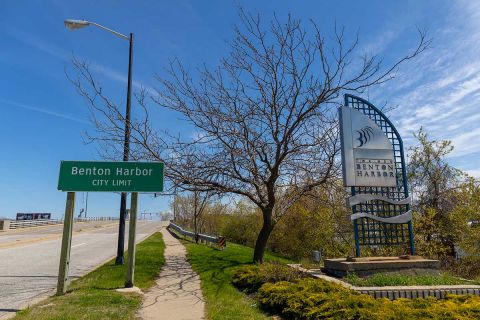“The water infrastructure in Benton Harbor, like many cities across the country, needs upgrades and investments to build resiliency and protect people from lead,” Regan said.
The state and federal actions follow a September petition from local activists and environmental groups, who urged federal regulators to get involved in Benton Harbor after three straight years of water tests showed elevated lead levels in some residents’ taps.
Activists complained that local and state officials were not moving fast enough to fix the problem, and had not done enough to make sure Benton Harbor residents were aware of the problem and able to access safe water.
In addition to requiring the water system to correct those issues, the EPA order directs Benton Harbor to hire an outside firm to “analyze options for long-term operations and maintenance of the city’s water system,” including possible consolidation with nearby water systems.
An EPA release said the agency has offered a “compliance advisor” with the expertise to assist the city with making the ordered changes.
Regulators have known for years about many of the issues flagged Tuesday. Following a 2018 inspection, EGLE officials flagged a host of deficiencies at the plant and directed the city to raise water rates to fund fixes.
Maintenance of the water system had been falling behind for years amid a struggle to generate enough revenue from ratepayers in the shrinking, high-poverty city. That imbalance was made worse when neighboring communities broke off of Benton Harbor’s water system to get their water elsewhere, leaving fewer customers to split the cost maintaining an old system that had been designed to serve a far bigger population.
A state-appointed emergency manager who formerly ran the city cut costs by firing staff at the treatment plant, something Benton Harbor Mayor Marcus Muhammad blamed as part of the reason for the plant’s decline.
Unlike that past approach, regulators are now acknowledging that Benton Harbor needs financial help to fix the problems.
EGLE Director Liesl Clark noted that the orders aren’t meant to be “punitive,” but rather “a transparent way of identifying the pressing needs of the Benton Harbor community so that federal, state, local and community partners can work together to prioritize them.”
Water activists who petitioned the EPA to get involved in Benton Harbor heralded Tuesday’s order as a win.
The order is “exactly what is needed to begin addressing Benton Harbor’s long-term water problems,” said Cyndi Roper, a senior Michigan advocate with the Natural Resources Defense Council.
“The bottom line is, there have been decades of disinvestment that have left residents of Benton Harbor with a grossly inadequate water system,” Roper said.
In the weeks since a host of local and national groups petitioned the EPA, Michigan regulators have dramatically ramped up their response in Benton Harbor, including offering up free bottled water and advising residents not to drink even filtered tap water until the EPA conducts a study to make sure filters are effective at stripping away lead from Benton Harbor’s water.
And following years of little progress toward removing Benton Harbor’s lead pipes, state lawmakers and Gov. Gretchen Whitmer last month reached an agreement to dedicate $10 million toward the project.
Whitmer, vowing to get the city’s thousands of lead lines out of the ground by spring of 2023, has called upon the legislature to offer up another $11.4 million to fully fund the roughly $30 million project.
Benton Harbor Mayor Marcus Muhammad could not be reached for comment Tuesday afternoon.
In a statement, U.S. Rep. Debbie Dingell applauded the EPA order, calling it “a critical step to protecting Benton Harbor residents.”
Credit: Source link






























